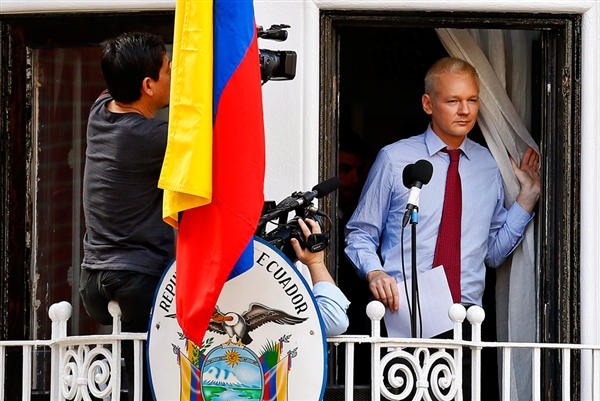In “The Man Who Came To Dinner,” Sarah Ellison’s new Vanity Fair piece about Julian Assange, we get a look at the Wikileaks mastermind as he’s confined to the Ecuadorian embassy in London, dodging a likely indictment from the U.S. for espionage and certain interrogation from Sweden about alleged sex crimes. Yet behind closed doors, he telecommutes at will, running his document dump seamlessly, striking a pose that’s equal parts Ellsberg and Polanski. An excerpt:
“Even before the Snowden affair brought him back into the limelight, Assange had been busy. During his year of confinement at the embassy, he has released a vast cache of documents, written a book, addressed the U.N., founded a political party in Australia and launched a bid for a Senate seat there, entertained socialites and celebrities, maintained contact with leakers and whistle-blowers all over the world, and worked behind the scenes to influence depictions of him that are now hitting movie screens (the most high-profile being a DreamWorks production starring Benedict Cumberbatch). As for the Snowden case, Assange and WikiLeaks have served, in effect, as Snowden’s travel agents, publicists, and envoys; it is still not clear how far back the Snowden connection goes, or precisely how it originated, though the filmmaker Laura Poitras likely played the key role.
Assange cannot move from his quarters, but he is either at his computer or in conference, working in an impressive number of spheres. ‘He is like any other C.E.O.—plagued by constant meetings,’ WikiLeaks told me. He employs sophisticated encryption software, which anyone wishing to make contact with him or his circle is encouraged to use. To gain a sense of his life and work, during the past months I have spoken to Assange’s lawyers and to many longtime or former friends, supporters, and professional associates. (Some have requested anonymity.) Daniel Ellsberg, the former U.S. military analyst who brought the Pentagon Papers to light, has met with Assange and speaks with personal knowledge about the lonely life of a leaker and whistle-blower. ‘We are exiles and émigrés,’ he told me.
But the fact that Assange has had to take himself physically out of circulation has had the effect, oddly, of keeping him more purely at the center of things than he was before. His legal perils have not receded, but his state of diplomatic limbo means that he is no longer being hauled out of black vans and in front of screaming reporters and whirring cameras. The U.S. government has tried to decapitate his organization, which has only made him a martyr. No one is talking, as they were when he was free to mingle with the outside world, about his thin skin, his argumentative nature, his paranoia, his self-absorption, his poor personal hygiene, his habit of using his laptop when dining in company, or his failure to flush the toilet.
‘If anything, I think he’s stronger and more sophisticated than he used to be, and so is the organization,’ Jennifer Robinson, an Australian human-rights lawyer best known for her work defending Assange in London, told me. ‘They’ve weathered three years of intense pressure and all forms of legal and political attacks, and they are still here and still publishing and still making headlines.’ Today, Assange is alone and unbothered, but not isolated—the unquiet center of a web whose vibrations he can both detect and influence.”
Tags: Julian Assange, Sarah Ellison

